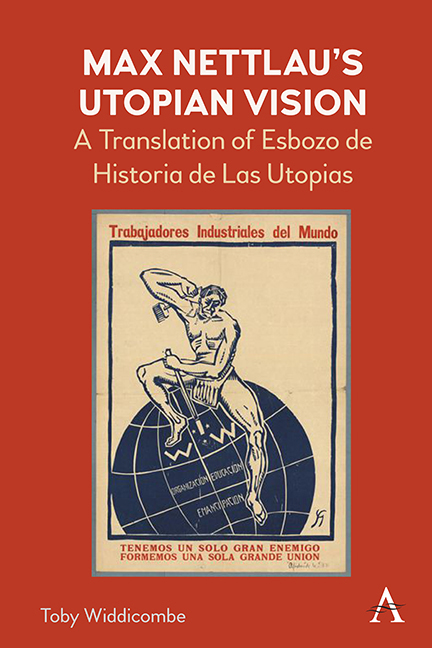Book contents
- Frontmatter
- Dedication
- Contents
- Preface
- Acknowledgments
- Introduction
- Outline of the History of Utopias
- 1 Definition
- 2 The Classical and Medieval Ages
- 3 The Renaissance and Neo-Classical Periods
- 4 The Nineteenth Century (to 1888)
- 5 1888 to the Twentieth Century
- 6 The Twentieth Century: 1900–1925
- Notes
- Appendix A Select Nettlau Bibliography
- Appendix B An Annotated Gazetteer of Nettlau’s Utopians
- Appendix C List of Intentional Communities in Esbozo
- Appendix D List of Utopian Newspapers and Journals in Esbozo
- Bibliography
- Index
3 - The Renaissance and Neo-Classical Periods
Published online by Cambridge University Press: 18 November 2023
- Frontmatter
- Dedication
- Contents
- Preface
- Acknowledgments
- Introduction
- Outline of the History of Utopias
- 1 Definition
- 2 The Classical and Medieval Ages
- 3 The Renaissance and Neo-Classical Periods
- 4 The Nineteenth Century (to 1888)
- 5 1888 to the Twentieth Century
- 6 The Twentieth Century: 1900–1925
- Notes
- Appendix A Select Nettlau Bibliography
- Appendix B An Annotated Gazetteer of Nettlau’s Utopians
- Appendix C List of Intentional Communities in Esbozo
- Appendix D List of Utopian Newspapers and Journals in Esbozo
- Bibliography
- Index
Summary
Serious utopian thinking about a better society was only revived eighteen centuries after Plato by Thomas More (1478–1535) with his Utopia (1516).
An awareness of a lack of social justice was not missing during the long span of the Middle Ages. The idea of natural right (i.e., a theoretical utopia of abstract forces) and even the notion of a golden age were acknowledged, albeit only in a Platonic sense, by hard-hearted jurists and by Church fathers greedy for temporal as much as spiritual dominion. This natural right established the existence of an aboriginal equality and liberty; it recognized neither the exclusive right of the few to wealth nor the exploitation of the rest. The law and the Church have always provided themselves with loopholes by means of which they could deny that they were defending their positions of power. This strategy did not prevent them from being fierce apologists for every part of the power structure or from taking advantage of that structure in order to threaten natural rights and social Christianity when the people showed themselves to be fed up with being dominated and exploited. In this way, the two (the law and the Church) have acquired absolute political and administrative power and, as far as the Church is concerned, enormous wealth. And at the same time, the ideal utopian element in their theories has appealed to men of great intelligence and heart. Thomas More is the perfect example of a man of this sort, one who understands the idea of natural right and the social criticism directed at the church, and one who understands the Renaissance, Platonic humanism, Plato's Politeia, and the best that the Romans and Greeks produced. More is such an expert in justice as well as commerce that, in this age of great discoveries, he conceives vast plans, and sees unknown worlds brought nearer to discovery by every journey. He also sees the suffering of the poor and the machinery of government that crushes them. He says clearly, and these words always have worth, that all modern states seem to be nothing more than a conspiracy of the rich who, under the pretext of a common salvation, look after nothing more than their own fortunes; they pass regulations in the name of all, and therefore in the name of the poor also, and call them laws.
- Type
- Chapter
- Information
- Max Nettlau's Utopian VisionA Translation of Esbozo de Historia de Las Utopias, pp. 15 - 26Publisher: Anthem PressPrint publication year: 2023

